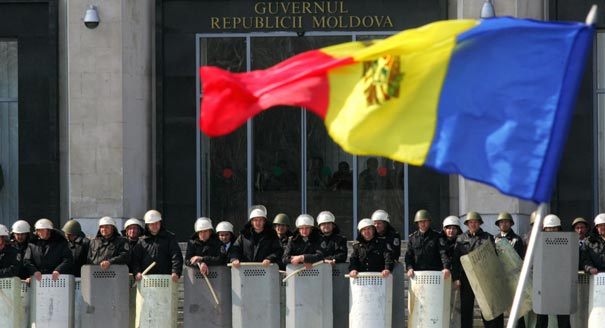In Moldova’s capital Chisinau it is a “golden autumn,” with warm sunny days even as yellow and golden leaves are piling up on the pavements. In the cafés however the mood is not so bright. The chattering classes worry about how their country finds itself at the center of a geopolitical clash between the European Union and Russia, just as elections are approaching on November 30.
“It’s interesting to live in Moldova, but hard to survive,” says political analyst Igor Butan.
In some Western analysis the conventional wisdom is that Moldova could be “next in line” for Russian state aggression because of the unresolved Transnistria conflict. On the left bank of the River Dniester, Transnistria persists as an unrecognized breakaway statelet, 22 years after the conflict with the government of Moldova. It has a loyal pro-Russian orientation and is home to 1,500 Russian peacekeepers.
Moreover, the Transnistrians do not want to be “protected” either. For all the declarations of support for Russia, the enclave also relies heavily for its economic survival on imports via Odessa and exports to the European Union via Moldova. They want to keep their options open.
If Moscow wants to bring turn Moldova back from its European orbit, Moldovan domestic politics are a much more promising arena. The country has a large Russian-speaking population and hundreds of thousands of migrant workers in Russia. The Gagauz minority—Turkic, Orthodox Christian and Russian-speaking—is oriented towards Russia. Much of the population still watches Russian television.
So, the Russian strategy is to try to get the current governing coalition defeated in the election.
In many ways, the governing coalition of three parties proclaiming the European way is giving Moscow a helping hand. Since they took power in 2009, they have maintained democracy and passed anti-discrimination legislation that secured the signing of the Association Agreement with Brussels in the summer of 2014 and visa liberalization for Moldovan citizens.
Yet over that period support for the European idea has actually fallen. That is because in a country where business and politics are fused, the political class is regarded by most of the population as pervasively corrupt and not looking after the interests of ordinary people. In a recent detailed report, independent journalist Vladimir Soloviev called Moldova a “failing champion of European integration.” The conclusion is that corruption in the judiciary and other spheres of public life may be a bigger threat to Moldovan statehood than anything Russia can do.
Those in Western capitals who still like to play the game of “picking favorites” should pause to reflect that unconditional love has its dangers.
But the differences between the current governing coalition and the Communist Party led by Vladimir Voronin may not be so big as they appear. Despite his support from the Russian-speaking electorate and pro-Moscow declarations in the past, Voronin also engages in games of bluff. He has hinted more recently that he would not revoke the Association Agreement and would continue the drive to Europe, albeit at a slower pace. Voronin also has better ties with Transnistria than his opponent. But he is far from being Moscow’s best friend either. The Kremlin will never forget that it was he who rejected the “Kozak plan” for Transnistrian conflict resolution in 2003.
In Moldovan’s shifting domestic politics, the Russians cannot be so sure of their “favorites” either.





